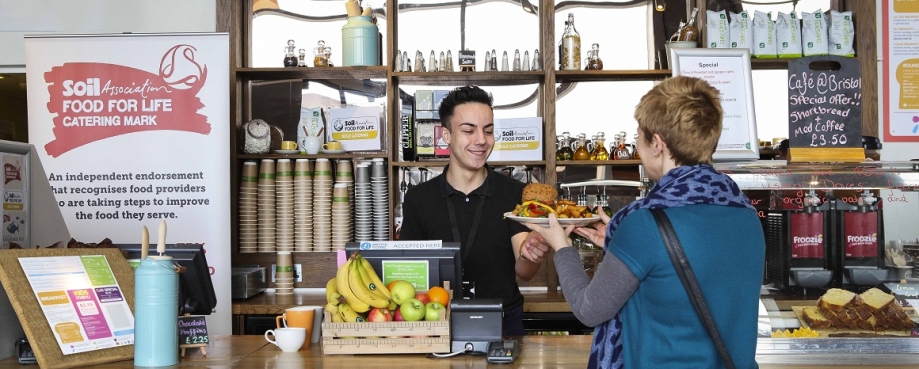
The Soil Association’sFood for Life Catering Mark can help companies’ Corporate Social Responsibility teams bridge the gap between supporting staff and community outreach, writes guest blogger Emily McCoy in advance of a 29 November meeting between CSR heads and caterers.
Considering a third of our daily calories are consumed at work, it’s surprising that food provision rarely features in overall company strategies.
While employee health and wellbeing has risen sharply up the public policy agenda, and many businesses are putting in place expert teams to handle corporate social responsibility (CSR), food still seems pushed to the corner. Yet providing good food in public and private sector canteens will benefit the CSR function.
The UK has one of the highest levels of obesity in Western Europe and we’re continuously told that more must be done to address this. It’s one of the reasons why the Soil Association has been campaigning to improve food in the public and commercial sectors.
As such, our Food for Life Catering Mark provides an independent endorsement that food providers are taking steps to improve the food they serve, using fresh ingredients which are free from undesirable additives and trans fats, are better for animal welfare, and comply with national nutrition standards.
So how is a plate of veg rather than a cone of chips going to get the ‘fat man of Europe’ out of his armchair and back to the office? And why is it linked to CSR?
We love chips: what’s the problem?
Over the last two years, many businesses have been increasingly pressured to expand their vision around sustainability and staff wellbeing.
While the cost of employee absenteeism is estimated at £27 billion (CIPD’s Employee Health & Wellbeing Agenda), the cost to people’s health could be much higher and all workers deserve access to healthy food.
The Soil Association is asking businesses to step up, take responsibility and make healthy food the easy choice.We are all aware that chips every day are not the answer. But if the choice is a freshly fried cone of frites or some limp lettuce served up with sloppy mayo, it’s easy to see where the problem is.
The NHS’s Eatwell guide shows that we should eat at least 5 portions of fruit and veg a day. It advises that we reduce the sugar, salt and fats in our diet and make sure we drink plenty of fluids – and not the sugary type.
But how does food relate to CSR and staff wellbeing?
Healthy people are reported to perform better at work, have increased morale, and not be absent as frequently.
By providing a healthy environment, and good food choices, a business may find that it has happier staff, but may also find wider benefits within the community.
Although there is still a way to go, the Soil Association’s Food for Life Catering Mark is making waves in catering in schools, hospitals, care homes, nurseries, universities and workplaces – which are all taking steps to improve their food.
These places are already seeing positive change: we want other workplaces to up the ante too.
Good food inside and outside the office
Studies show that for every £1 spent on a Food for Life Catering Mark meal, £3 goes back into the community. Those eating the food benefit, but those cooking the food do too, and it goes all the way back to food in the home.
Good food reaches out across different businesses and industries too – recent data reveals spend on Catering Mark meals on British Red Tractor assured meat and meat products is over £40m per year.
Other higher animal welfare schemes are also supported, with spend on free range meat and poultry reaching £3m per year and on MSC sustainable fish over £5m. This isn’t just better for an improved economy but supports our environment too.
These ripples don’t go unnoticed.
The Catering Mark has been endorsed by Government, as cited in Defra’s Balanced Scorecard. And workplaces such as the House of Commons, the National Trust, Jaguar Landrover, Pepsi Co. and ETI member John Lewis all provide Catering Mark meals for staff.
Although it is relatively ground-breaking to include food in a CSR strategy, it could be the answer to many of those recurring nightmares about improving support for staff and the community.
On Tuesday 29th November the Soil Association is holding a meeting between CSR heads and caterers to work out how together we can overcome the challenges and make better workplace food matter.
